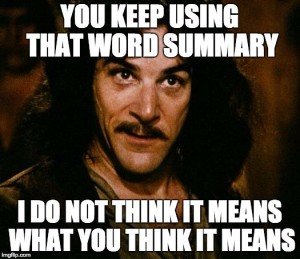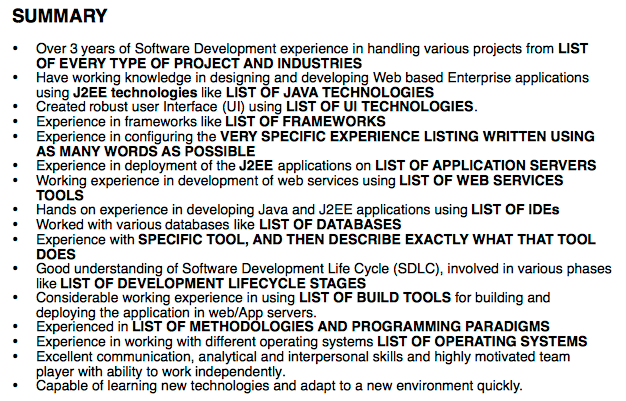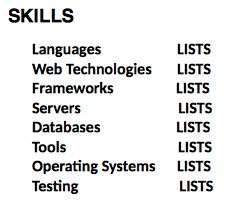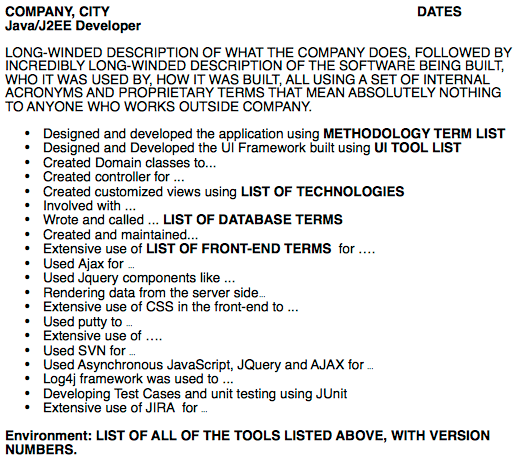The Worst Developer Resume in the World
As someone who has been recruiting in the software industry for nearly 20 years, I’ve read perhaps tens of thousands of résumés. Good and bad. My experience prompted me to launch a part-time résumé review and writing business (Résumé Raiders if you must know), as I found that résumé services were both grossly overpriced and of poor quality.
There is one résumé type that I get at least once a day, and it’s unreadable. It is immediately recognizable once I open the document and see the first page, and my suspicions are confirmed when my eyes wander to the bottom and see the dreaded “Page 1 of 7”.
I’m not sure as to why, but I belive this style is more common among Java developers – although admittedly my sample size for Java is larger than for other language communities.
The Résumé
It starts with a “summary”…
So the résumé’s summary is a half page long? The writer regurgitates every single technology they’ve ever used, puts them into bullet points, and has the audacity to call it a summary? This creates what we call a signal-to-noise problem, where the sheer volume of content makes it impossible for a reader to decipher what is important information and what is not. 
I preach to all my résumé clients that a summary is the most important part. Why? Résumés are often initially reviewed by recruiters, many of whom are inexperienced and not the best at identifying talent. The summary is an opportunity to tell the reader exactly who you are without having to let the reader interpret your experience.
You want to hire a Python developer with at least five years of experience? If a summary starts with “Python Developer with five years of experience…”, that doesn’t give even the most incompetent recruiter the chance of missing the qualification. Keeping the summary clear and concise is the key.
So what’s next?
Thanks…but didn’t we just do this??? We’ve now read the first page of the résumé, and the applicant has mentioned every technical skill at least twice. I know what you’re thinking. This is an attempt to get the attention of those ATS’s (applicant tracking system) we keep hearing about. When it is assumed that the reader is not human, some may choose to repeat keywords in an SEO-like attempt to game the system. Does it work? Probably not, but I don’t think that is the reason behind this.
But let’s keep reading…
After starting off with a summary which was really a set of bulleted lists containing buzzwords, followed by a skills section which was just a categorized list of the same buzzwords, we come to the experience section which is the same list of buzzwords accompanied by a short description of what those buzzwords do.
The Problems
There are a couple problems here.
The first is that the reader is looking to quickly qualify or disqualify an applicant. When the reader discovers that the résumé is seven pages that seems to mostly be lists of buzzwords, that doesn’t provide much incentive to read it. The size is intimidating to a reader, which gives a negative instinctual reaction. Imagine a friend is relocating and asks if you can help with the move, and on arrival you see a garage full of barbells and bags of sand.
Even if it’s part of the recruiter’s job to review résumés and make a yes/no decision, this style résumé is a lazy excuse to just say “no”.
The biggest problem, for both the applicants and the industry at large, is that these résumés sometimes belong to good developers. I’m a strong résumé writer but a weak coder, and there are likely thousands of people who are strong coders that have no idea about résumés.
If your résumé bears any resemblance to what I’ve described above, do yourself a favor and fix it ASAP.
| Reference: | The Worst Developer Resume in the World from our JCG partner Dave Fecak at the Job Tips For Geeks blog. |









This article isn’t really well written. All you do is list problems with resumes and then say fix them. If your intention was to actually help change the situation it would have been a good idea for each problem you list to also give a possible solution.
He did, actually. Summaries should be short and concise, while keeping information singular. Telling some “I use SOME RELEVANT TECHNOLOGY!” over and over tends to be detrimental. It’s not just beating a dead horse, it’s slaughtering the horse to beat it. Best resume advice I ever got: Keep your resume to one page. It will get read because, “Well, it’s only one page.”
This article wasn’t meant to be a “how to” piece on resume best practices as much as it was a post to highlight an issue in the industry. If you want to know what you should do, it’s not too difficult to figure out the opposite approaches. “Don’t write a full page summary” – write a short summary instead. “Don’t list every technology you’ve ever heard of” – only list relevant, useful technologies that you have used recently. You aren’t the only person to mention this, and I’m working on a follow-up to give more of a ‘to do’ list… Read more »
I agree. It’s not his intention to help, but to direct most readers to his “if you must know” business and than charge them for help…
I understand he has to make a living, but that kind of advertisement is sketchy at best…
So you’ve now interpreted my intentions? I would have linked my business several more times, and probably mentioned my recruiting business as well, if my intentions for this article were just to make a few dollars. It actually IS my intention to help, and most of the resume work I do is still done for free on behalf of candidates I work with in my recruiting business. This site doesn’t pay me to post my content, and I’m never sure what they will or won’t post. I will promote my business at times when relevant to articles I publish, and… Read more »